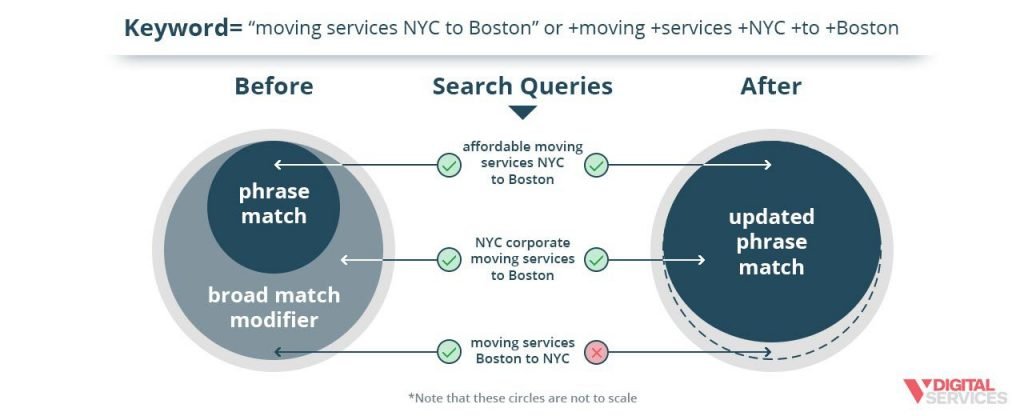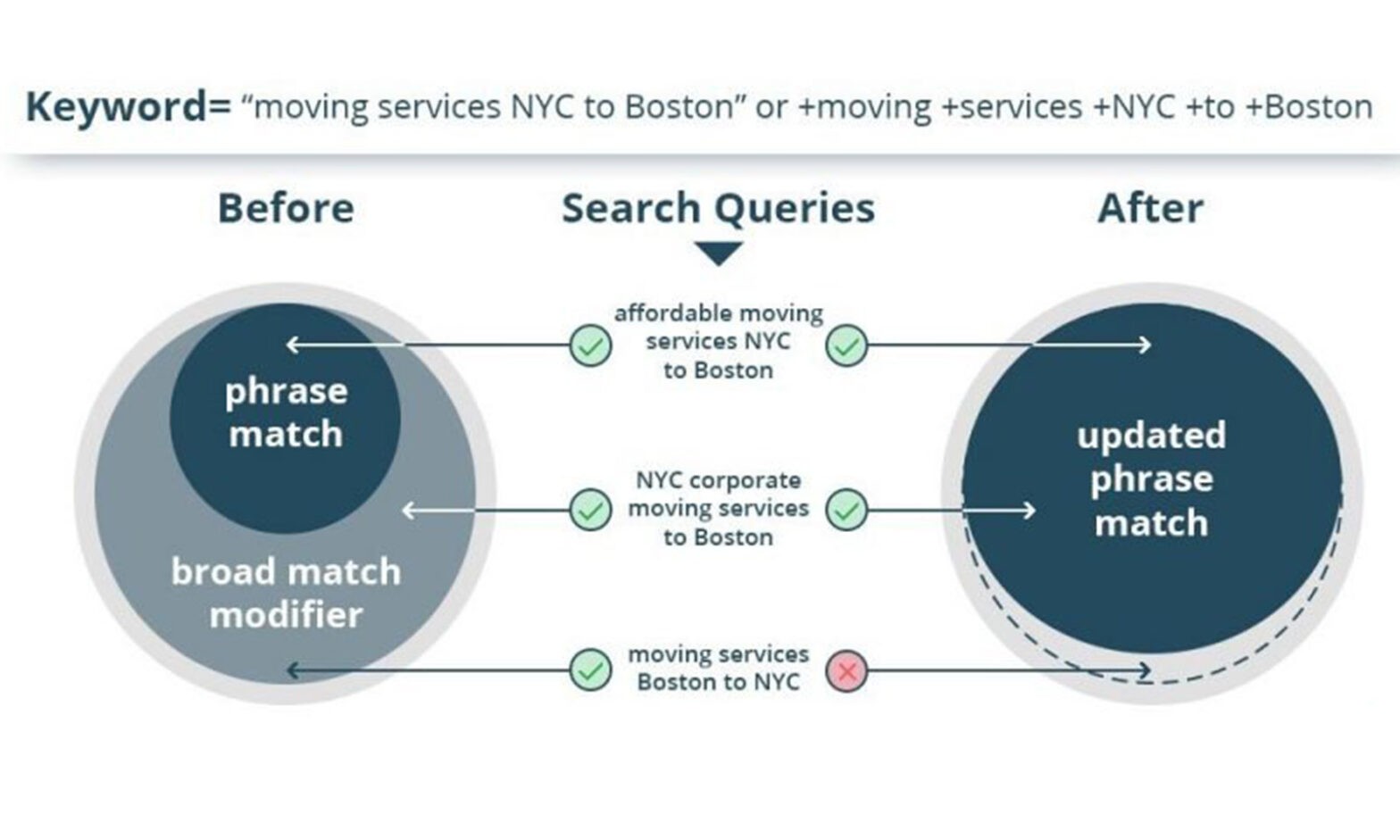Starting February 18, 2021, Google ads announced that they would be making changes to broad match modified (BMM) and phrase match keywords. Phase one has already started rolling out to eight languages (English, German, Spanish, French, Italian, Dutch, Portuguese, and Russian); all others will roll out in Q2. Google expects to be fully rolled out mid-summer 2021. The result is the phasing out of broad match modified to an evolved version of phrase match, with both match types performing with the same matching behavior. Although they announced there is no need to take any immediate action, there is a need to be vigilant as the change will result in how existing match types will perform in the coming weeks and months.
Why is Google making the change now?
Google stated that their research showed both broad match modifier and phrase match were “serving the same use cases and that you can reach more of the right customers through a combination of the two.” This is why they decided to roll out the newest update to these two-match types. They believe the change will simplify the different match types required on accounts and streamline the process. They also think the change will make managing your keywords easier, opening more time for more beneficial account management functions, such as researching new keywords and improving the message to end-users.
What is changing, exactly?
Over the last decade, Google has made changes to keywords that have built the foundation for the latest announcement to phase out broad match modified keywords. You may remember that phrase match was designed to keep the word order in the query while broad match was designed so that only certain words needed to be present in the search query, regardless of order. In 2019, Google expanded searches in both match types to include the same meaning, just as exact match did in 2018. When the rollout is complete globally, you will only have three options: broad match, phrase match, and exact match keywords.
The latest update has phrase match changing into a combination of both broad match modified and phrase match keyword. The new phrase matching behavior will expand to include additional broad match modifier traffic while respecting word order when it is important to the meaning. As the update is rolled out, broad match keywords will begin using the new phrase matching behaviors.
Until the change, broad match modifier matched to queries that included your keywords that contained the plus sign in any order. As this is rolling out, broad match will begin to include every word while respecting the meaning of the search. Both match types will start matching to queries that include the “same meaning” of the keywords.
 In the example, Google gave a “moving company that wants to reach people looking to move out of New York City. With the updated phrase match, you can reach people looking to move from NYC to Boston, without showing up for people looking to move from Boston to NYC.” The broad match keyword +moving + Services + NYC + to + Boston” will start to perform in the same manner. Broad match will no longer serve those looking to move from Boston to NYC, and the algorithm will recognize the meaning of the end-users search.
In the example, Google gave a “moving company that wants to reach people looking to move out of New York City. With the updated phrase match, you can reach people looking to move from NYC to Boston, without showing up for people looking to move from Boston to NYC.” The broad match keyword +moving + Services + NYC + to + Boston” will start to perform in the same manner. Broad match will no longer serve those looking to move from Boston to NYC, and the algorithm will recognize the meaning of the end-users search.
Below are more examples to illustrate how matching behavior will change after this update:
| Broad match modifier keyword | Queries that will no longer match after the update |
| +resume +services | what are some customer service skills to put on a resume |
| +best +sneakers | best prices on sneakers for toddler |
| +used +printers | companies that used daisy wheel printers |
| Phrase match keyword | Queries that will match after the update |
| “holidays in zambia” | holiday spots in zambia |
| “long sleeve dress” | long sleeve lace dress |
| “womens boots” | new womens size 37 boot |
https://support.google.com/google-ads/answer/10346549?visit_id=637538125987213990-3863257095&rd=1
How to remain successful moving forward
Google is making the changes internally on how the system uses both match types; therefore, no immediate changes are required on existing keywords which is great, and you get to keep the historical data. Being proactive in changing existing broad match keywords is not advised. Doing so may result in a drop in traffic. Moving forward in preparation for what is to come, you should start using phrase match on all new keywords. Spend this time monitoring account performance.
- Review existing keywords and update bids, budgets, and targeting as needed to adjust for any changes in performance in your account.
- Monitor your search terms report for additional user searches to stay on top of new search queries. You will also want to use this to add negative keywords for any unwanted search queries.
- Review any add keyword recommendation and leverage keywords planner should you see drops in traffic volume.
Once the rollout is complete, Google will begin to surface recommendations to remove redundant broad match keywords in ad groups using phrase match keywords. During the transition, remain vigilant in keeping up on your keyword review process to see account success.
Need assistance to stay on top of the changes, or do you just prefer to leave it to the experts? V Digital Services is a full-service digital marketing agency with a team of paid media specialists to help you stay on top of the changes. Contact V Digital Services today!


 PREVIOUS
PREVIOUS